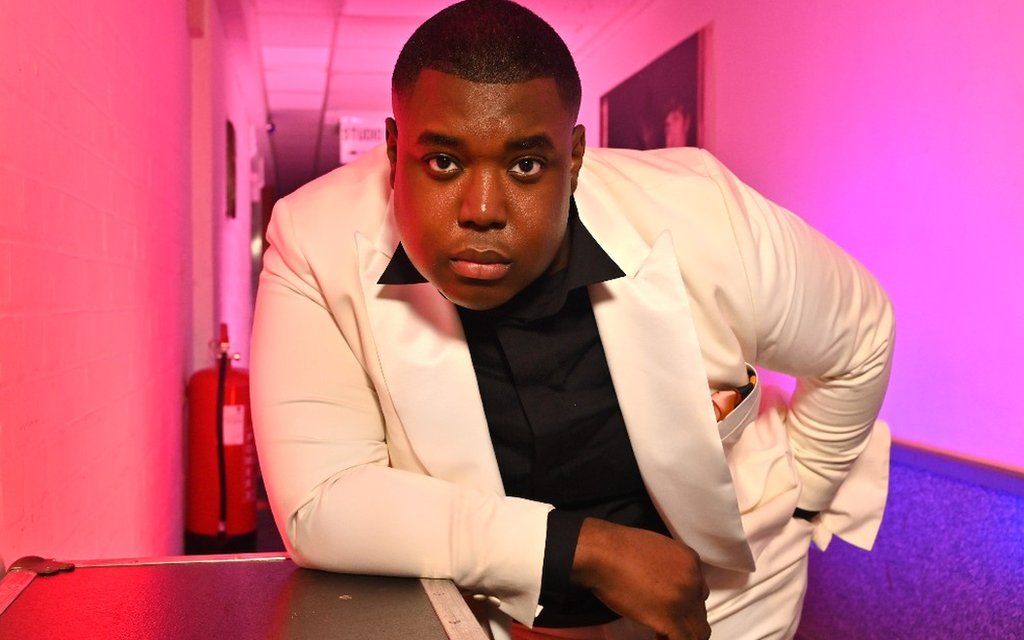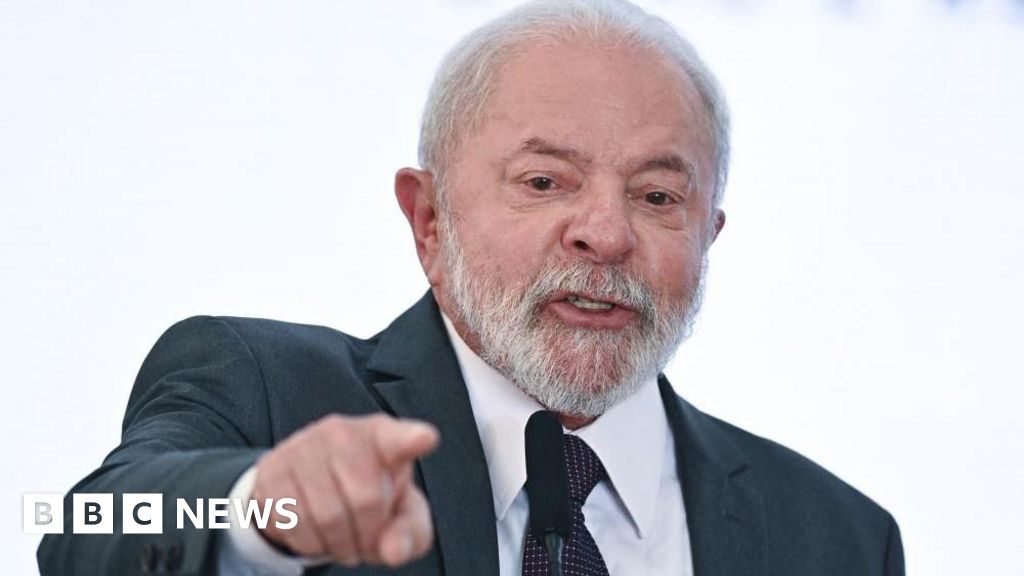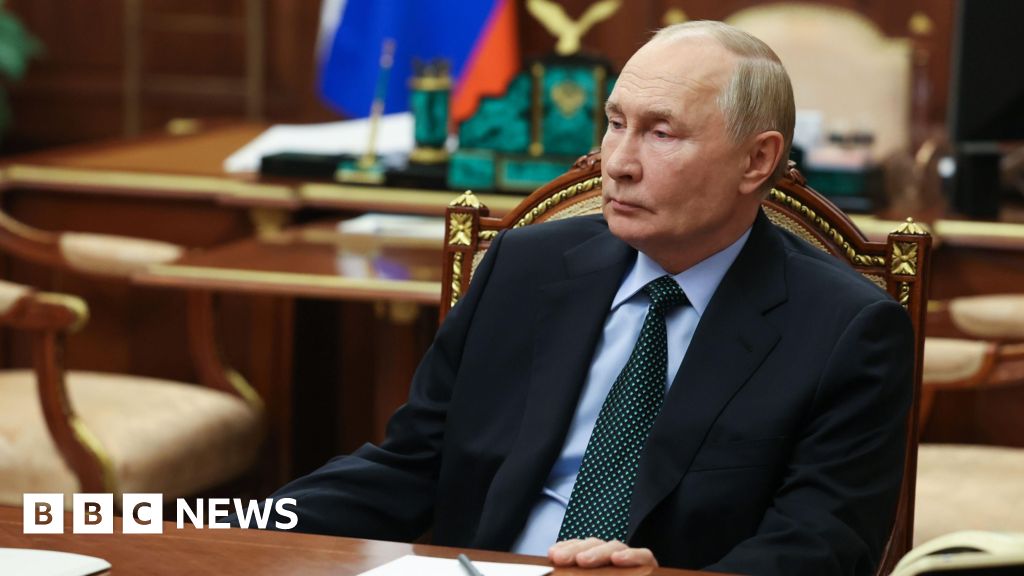ARTICLE AD BOX
By Mark Savage
BBC Music Correspondent

Gabriels singer Jacob Lusk was a contestant on American Idol before the band formed in 2016
The lead singer of LA-based band Gabriels has just stepped off stage at Glastonbury, where an unexpectedly large crowd watched their soul-soaked, mid-afternoon set.
"When Beyoncé did Glastonbury years ago, she'd go, 'GLASTONBURY, ARE YOU READY?!' And I used to scream that in my living room," he says. "So to actually be at Glastonbury, it's a little overwhelming.
"I feel love just everywhere. It's a good vibe."
Dressed in a custom green and blue satin robe, the singer is full of zest, cackling as he describes the gulf between his Glastonbury gladrags and the shabby hotel he's been forced to stay in.
"I went to use the soap dispenser and grit came out," he laughs. "We're new artists, so I guess we don't have the big budget."
If all goes according to plan, that won't last long.
Image source, Getty Images
Image caption,Gabriels singer Jacob Lusk on stage supporting Sir Elton John in Hyde Park in June
Gabriels set the industry abuzz in 2020 with their debut EP, Love And Hate In A Different Time, which Sir Elton John called "one of the most seminal records I've heard in the last 10 years".
The title track is both fire and brimstone as Lusk sings of "rapture coming" and the "walking dead all around me" over convulsing Motown drums and ominous spiritual chants.
The cracked beauty of his falsetto makes him sound like a fallen angel.
In the video, the music comes to a sudden halt and the picture cuts to footage of Lusk singing Strange Fruit to thousands of people at a Black Lives Matter protest.
"That whole song came out of our souls, because of what we were experiencing," he says. "Everything seems to be going backwards. Racism. Sexism. Homophobia. What is happening? We're supposed to be progressing."
Warning: Third party content may contain adverts
As word about the EP spread, Gabriels came to London, played a series of intimate, word-of-mouth gigs, and gave a show-stopping performance on Jools Holland's TV show.
By summer 2021, they had signed a deal with Parlophone Records and started crafting a debut album.
When we speak in June, Lusk says the record is "50 or 60% done". A few weeks later, Gabriels cancel weeks of tour dates so they can head home to finish it.
Lusk hated the idea. "I'm a new artist and cancelling shows just makes you seem undependable," he says, catching up over Zoom in September. But the band faced a quandary: Kendrick Lamar and Beyoncé producer Sounwave wanted to work on the album, but he was only available for four weeks in the summer.
"I don't know if you heard Kendrick Lamar's latest album, but it's like a fine cognac," says Lusk.
He decided the opportunity was too good to turn down.
American Idol 'treachery'
In the ensuing flurry of activity, songs were pulled apart, reconfigured and reworked. The result is Angels and Queens Part One, a stunning mix of haunted gospel, stuttering electronics and timeless melodies. It's as if Marvin Gaye made a record with Portishead, then played it back at the wrong speed.
The Independent calls it a work of "real emotional depth". The Guardian says it "could be the album of the year".
The band's not-so-secret weapon is Lusk's voice. Raised in the Apostolic church, he can break your heart with a tremulous whisper and knock you sideways with the full force of his lungs. But he's always wary of overpowering the material.
"When you're a big singer, there's this pressure to do the high note, the money note," he says. "But that's selfish, because that's not the heart of the song."
Image source, Julian Broad
Image caption,Gabriels (left-right): Ari Balouzian, Ryan Hope and Jacob Lusk
Lusk has been perfecting his vocals for decades - first in church, then as a backing singer for Nate Dogg.
In 2011, he auditioned for American Idol and got his first taste of fame ("I went to the Philippines and I got chased through a mall by 100 people"), but the competition left him scarred.
"It was a lot of manipulation," he says. "There was a lot of, like, gay-bashing that happened behind the scenes. Oh, it was treacherous."
He's cautious about saying more, but acknowledges that an uncertainty "about who I was" clashed with the producers' need to create a character.
"I wasn't gay enough, I wasn't straight enough, I wasn't man enough, I wasn't black enough," he says. "For some people, that was confusing."
After he was eliminated, "I couldn't even watch the American Idol videos," he adds. "Like, I literally thought I couldn't sing. It was harrowing."
Idol should have been a springboard to a solo career, but various deals and managers fell through. Lusk considered quitting music altogether, but ended up becoming a choir director, working with artists like Diana Ross and Gladys Knight.
The seeds of Gabriels were sown in 2016, when classically-trained composer Ari Balouzian and Sunderland-born video director Ryan Hope hired Lusk's choir to work on a commercial.
"Jacob was leading and arranging the choir in a way that made it interesting, no matter what the material was," Balouzian later told Rolling Stone. "All the other singers were looking to him for direction. He was coming up with stuff on the spot very quickly."
They wanted to work with him again. "Ryan asked me to come to his house in Palm Springs and record with him for a week." But Lusk had reservations and declined.
Rebirth
So Balouzian and Hope went to the singer's church instead, taking a remote recording studio in the hope of persuading him to step in the vocal booth. When he did, everything changed.
"The first thing we recorded was called Wreath and it was beautiful. That's when I was like, 'Oh, I think I'm gonna keep hanging around these boys'."
The trio reconvened every couple of weeks between their day jobs and, slowly, the project unlocked something Lusk thought he had lost forever.
"It allowed me to love music again. Like, remember that? Remember when we used to listen to music and write songs for fun? Being with Ari and Ryan literally changed my life."
That's the feeling they have tried to capture on Angels and Queens. The front cover literally shows Lusk being baptised, symbolising his rebirth through music.
"How I live, how I move, who I am... even the way I perform is different now. It's very fearless."
Warning: Third party content may contain adverts
Even so, there's a thread of loss and regret running through the record. The mournful If You Only Knew was written immediately after Lusk discovered that his godsister, who had been struggling with addiction, had been found dead. Taboo is a stark, dramatic account of destructive relationships, inspired by an entanglement Lusk had with a "very famous" hip-hop artist.
"There were guns and all kinds of crazy stuff going on," he recalls. "Ari and Ryan were like, 'You're gonna need to leave that situation alone'."
The immediacy of his lyrics are Lusk's defence against people who dismiss Gabriels as a "retro" band.
"I'm like, 'No, it's only retro because you don't hear people using real instruments or really singing any more.' It's not retro. I'm talking about real life, happening-right-now kind of stuff."
Incredibly, the seven tracks on Angels and Queens Part One are only half of the story. Part Two will arrive next year, completing the album. Lusk describes it as "a continuation of the story" and "a little more fun".
"I'm gonna be transparent with you," laughs the singer. "The reason it came out like this is because I didn't want to wait!
"But, trust me, round two is going to be wild."

 2 years ago
18
2 years ago
18








 English (US)
English (US)